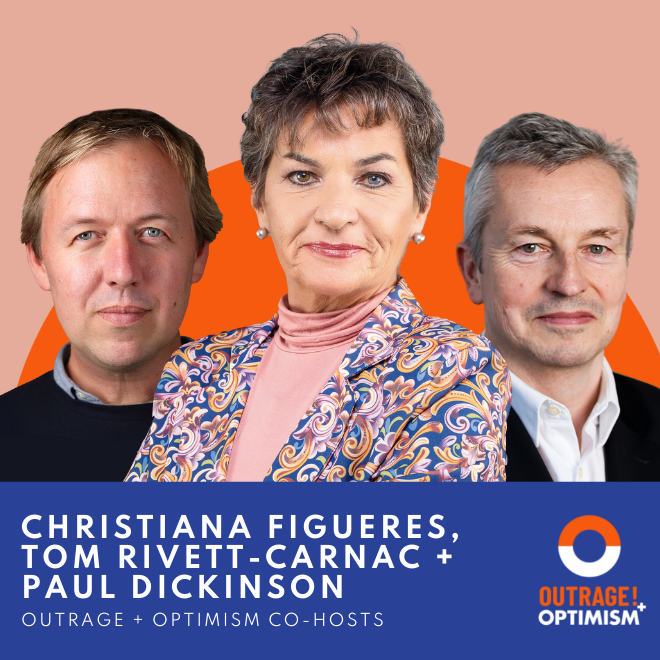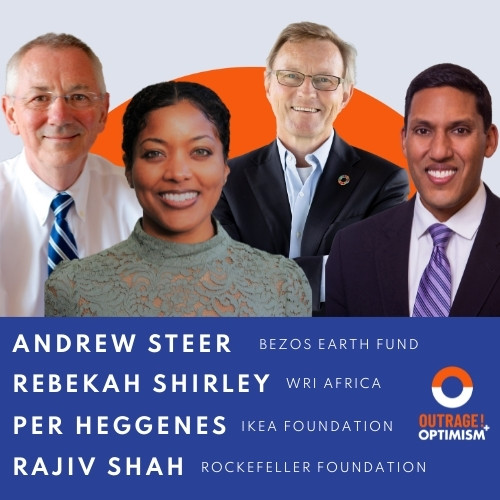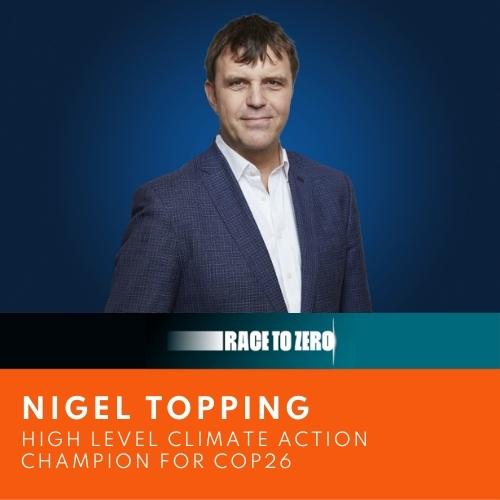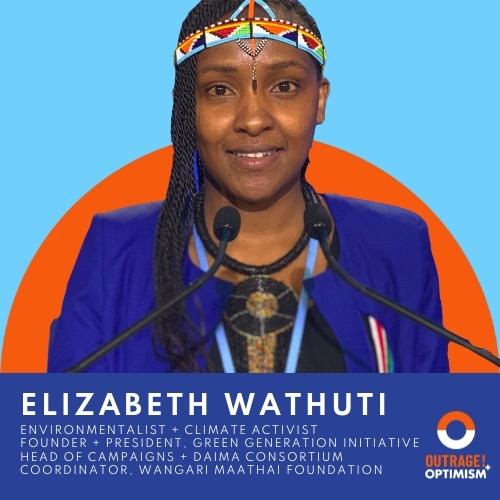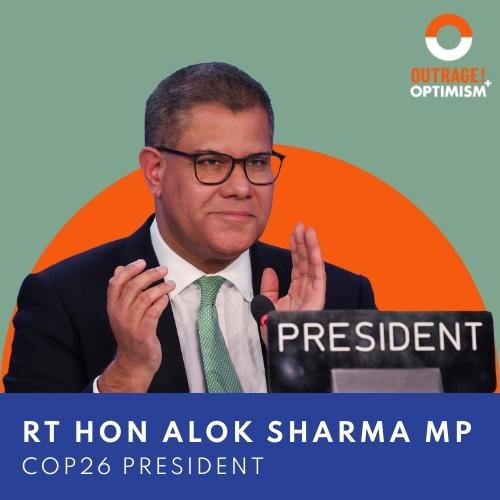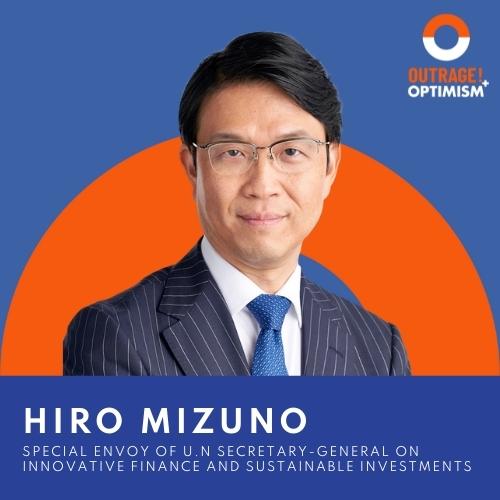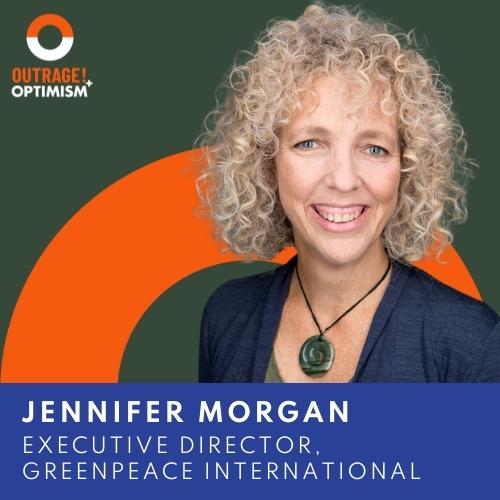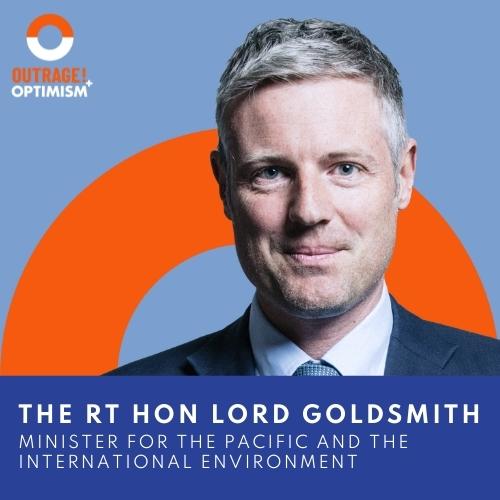129: COP26: Glasgow Pact and Ready to Go Further
The Glasgow Climate Pact is ready to go further.
About this episode
Nearly 200 countries have agreed to adopt the Glasgow Climate Pact after a rollercoaster of a COP26 – and this is a really big deal. From agreeing to reduce global dependence on coal to speeding up the end of fossil fuel subsidies, this is progress on paper. But how far does it go to keep our 1.5C target front and centre?
This week, our hosts dig through a few key details of the agreement, including the new commitment for every country to revisit and strengthen their emissions reductions plans together at COP27, instead of in five years time as previously required.
So let’s take a collective breath, get a good look at this thing, and find out where we go from here.
Stick around to the end for a special Pass The Mic segment that shares some of the voices we heard around the corridors and in the streets of Glasgow during COP26.
Watch
Full Transcript
Transcript generated by AI. While we aim for accuracy, errors may still occur. Please refer to the episode’s audio for the definitive version
Tom: [00:00:12] Hello and welcome to Outrage and Optimism, I'm Tom Rivett-Carnac.
Christiana: [00:00:15] I'm Christiana Figueres.
Paul: [00:00:16] And I'm Paul Dickinson.
Tom: [00:00:18] Today we take stock of what happened in COP26. How far did it get us and what do we still have to do? Plus, we hear some of the voices that we encountered in the corridors in Glasgow over the last two weeks. Thanks for being here. So today it is Sunday, the 14th of November. We are all home. Christiana and I have been home for a few days. Paul just barely made it back to London a few hours ago or maybe yesterday.
Christiana: [00:00:46] After some serious dancing, I would say.
Paul: [00:00:51] Your spies are all over Glasgow, Christiana.
Tom: [00:00:53] Posting photos! The world is kind of trying to make sense of what just happened, you know? I mean, it was a last minute dramatic moment at the gavel. We're sort of trying to wrap our arms around these amazing commitments that came out of a couple of weeks. And like so much in climate, it seems to be transformative and remarkable and not enough. So in this episode, we're going to try to unpack for you our analysis of what happened and principally, did this do what we said at the outset it was it needed to do, which is to keep 1.5 alive, which is a phrase Christiana I know you hate. And so we can unpick that too. But let's just start, Christiana. I'd love to know your top line reflections. This is the biggest COP since you were in charge in Paris. You watched friends and colleagues steer this through to the outcome that we are now looking at. Tell us how you're feeling and whether you were satisfied with what went down.
Load MoreChristiana: [00:01:50] Well, first, Tom, just because you say I hate the phrase 1.5, keep it alive. It's only because I'm so picky with my semantics, right? So let me clarify that right away. I just don't think keeping it alive is enough. That's my problem with it, right? So it's after the 1.5 report from the IPCC. We can't just be satisfied with keeping it alive. We have to keep it front and centre. That's my problem.
Tom: [00:02:18] Vigorous good health. Yeah, not just alive, vigorous good health.
Christiana: [00:02:22] Not just alive, vigorous good health. Thank you. Thank you very much.
Paul: [00:02:26] Can I say just one thing about 1.5? It's like it's not degrees. It's like how we're like, locked up in a room with a sleeping lion, and it's like how hard we're going to kick it in case it might wake up and eat us. So yeah, the lower the number, the better.
Christiana: [00:02:40] Yeah. And I mean, originally, the 1.5 keep it alive. You know, it rhymes and was very helpful in the beginning, but I vote for us migrating to front and centre, healthy 1.5, as opposed to just keeping it alive anyway. Having clarified that, one thing about the one point five eight, nobody you know who is who really understands the way the wheels of change move would have truly expected or realistically expected for COP26 to guarantee that we were on the trajectory at one point five. We have, you know, said ad nauseum here, and it is actually nauseous, that we are on a process of continuing to decrease temperature increases, as odd as that sounds. And we went into barriers with almost six degrees. We came out of Paris with 3.7. Now, with the collection of everything that has happened this year, including the last minute in Glasgow, we're not at three point seven, we're at two point four, much better, still unacceptable. But we are moving in the right direction. So obviously when we will look at this, when we get into the substance. But first, you know, just to be pretty blunt about, did COP26 guarantee a 1.5 degree pathway? No, and it never could have. And we are much closer. We have closed the gap, so we will get into that later.
Christiana: [00:04:21] But before we get into substance, could I, gentlemen, just comment on the tone of the final decisions because I'm actually quite impressed with the tone in addition with substance, and I want to point out a couple of things first. Much more urgency in the language that I've ever seen in twenty-five previous COPs. A language that expresses more urgency, more alarm, utmost concern. It feels to me like it's mirroring the language that was also much more urgent of the IPCC first working group that came out just a few months ago. And that's a good thing because policy should follow science. So the language is the same language of screaming from the rooftops had not happened before in any cop. I think that is excellent. Also excellent that this text recognises that we're in the critical, decisive decade and that we have to halve emissions by 2030. I am a little bit disappointed that the version number two of the text had said resolve to limit warming to 1.5, and then that was watered down to resolve to pursue efforts to limit warming to one point five. That was one of the watering downs that was disappointing on the upside. It's still there and so I think we can safely argue that 1.5 is now officially the new two degrees, which it wasn't in Paris.
Tom: [00:06:04] Just one question on the 1.5, what you mean by that is 1.5 is now the threshold, right? We are not going to go above 1.5?
Christiana: [00:06:12] The ceiling.
Tom: [00:06:12] Yeah, the ceiling. Ok, great.
Christiana: [00:06:15] Correct. Yeah. And that's pretty amazing, right? Because we've been waffling between well below two and 1.5 since Paris because science hadn't given us that clarity. And now we have the clarity. And it's captured in the text, so excellent. I am also totally delighted, my heart is singing honestly, that this text for the first time recognises with the clarity that it does the role of biodiversity, nature based solution, oceans, cryosphere. Finally, a much more holistic approach that doesn't say climate is over in this box. Biodiversity out of the box. Oceans in another box. No, no, no. It's all the same box. And I'm delighted at the holistic approach that is here for the first time. I'm also totally delighted that, as far as I can tell, this is the most inclusive text that I've seen, inclusive of the role of youth, calling them, frankly, to continue to pester us. I think that's brilliant. The role and the experience and the knowledge of indigenous people calling for more women participation, recognising the scale of action of private sector non-party stakeholders, recognising the need for just transition. All of that has a much, much more inclusive tone to the text. So all of that actually is on the plus side.
Tom: [00:07:46] So, that's great, Christiana, and so interesting to hear analysis of some of those tone elements that are so important, right? I mean, as the way in which we talk about this changes, then actually, it indicates something significant about the shifting politics. And I picked up exactly the same thing as you did that this really does seem to be being treated more like a crisis. Not enough for many people, of course. Like so much exactly, but more. And let's not forget, this is a negotiated text by 196 countries. Now let's start by just kind of going into the substance of what was delivered. And I think we should maybe start with adaptation because obviously mitigation gets much of the press of is 1.5 still alive and will get to that in a minute. But adaptation really had a moment at this cop because really the vulnerable countries have been coming back to the table and saying, we are really hurting. Climate change is happening now. People in our country are losing their lives. They're losing their property and we need to access proper finance in order to enable us to adapt.
Tom: [00:08:49] And the 100 billion, the famous 100 billion that was the original deal for bringing everybody to the table as a collective effort still hasn't been delivered. And yet those countries are being asked to come back to the table with more commitments to cut their emissions. So my reading of this is it was a bit of a mixed bag. There was an agreement that adaptation finance will be doubled, although there's a little bit woolly around what that means and when that will happen by. And there was also a big push, and this is slightly different to adaptation, but it's connected by vulnerable countries to have a loss and damage facility. That would be the places where countries cannot adapt and they are losing significant assets or natural environments, and they would be able to access funds to recompense them. Obviously, nothing can recompense at a certain point, but at least some funds to help pay for what they've lost, and that was pivoted just into a dialogue rather than anything substantive. So let's just get into that. Did you think that the package that was on the table around adaptation was fair, Christiana?
Christiana: [00:09:55] No, it is not fair. I definitely celebrate that the final text, both of them actually, start with adaptation as well they should. And so, you know, placement in these texts actually sends political signals, and that, I think, is very important. That adaptation is the first topic that is there and not enough. Other than the placement, there is nothing actually underpinning that placement. Yes, there is an agreement, as you say, for at least doubling of adaptation finance. Okay. But as you say, that's still pretty woolly. It creates a two year work program on adaptation that starts immediately. So presumably by tomorrow, Monday, it should start. And that is good. But honestly, I mean, I just cannot find words for the pain that especially the low lying islands are experiencing today already. Losing homes, losing livelihoods, losing hope. I mean, honestly, at what point are we actually going to be brave enough to be in solidarity with these people now? Having said that, I want to also correct myself because many of these people do not want to be treated as victims. Many of them are saying, Yes, we are the most impacted, and frankly, we are totally punching above our weight with respect to the solutions. And they are. They are being so courageous, such leaders, such amazing, amazing guiding lights. But the rest of us, those of us who live, are you guys who live in the North and me who lived in the north for such a long time. We are just not doing our job. The countries of the North are not doing their job. They're still seeing it as opposed to their interest to support adaptation for developing countries. That is the wrong interpretation.
Tom: [00:12:08] Can you understand why that's the case? Because it just feels like a slap in the face that that's not been brought more front and centre. I mean, the most extreme example of that is we had the UK government actually cut its overseas development aid budget this year when they were the presidency of the COP. We've seen multiple other countries not come forward with what they should come forward, and it seems evident to me, although I'm much less familiar with the process compared to you, that that's the key that would actually get the whole world moving forward together. So why haven't we gone further on this? Because the numbers are not that significant when you look, for example, at how much was spent on COVID?
Christiana: [00:12:41] No, exactly. And that's why it's mystifying, right? So I let me start by saying, I don't think there is any answer that actually holds water, but I could venture to put out what I suspect are some of the reasons, not that they hold water, but some of the reasons could be going all the way from, I don't know, insensitivity to the pain of others, which I hope is a minimal factor here, all the way to the concern that adaptation, especially when it goes into loss and damage, as as you've explained it, Tom, which is frankly unquantifiable, I think there's a concern that this will be a bottomless pit and that it will always be impossible to predict how much financial support needs to be there. That is probably true and cannot stand in the way of actually standing up to what we have right now. I think that's the range right from insensitivity to uncertainty of the bottom line and everything in between. None of that holds water.
Tom: [00:14:02] One of the issues that we should actually dig into in the coming year is loss and damage because it feels like it's had more traction at this COP than any other. And interestingly, you know, Nicola Sturgeon, Government of Scotland, offered to put two million into a loss and damage fund. A group of philanthropies came forward and said they've put money in, but it was not picked up, and donor countries didn't identify that as something they were prepared to do. They just started a dialogue. So that is falling short, frankly, of where it needs to be. And we should unpick that because that's going to be a big part of the next year, because, and we should turn now, maybe to mitigation, we now have in essence, a rerun of Glasgow next year. Obviously very different in many ways, but in this one way, which is that because countries did not come forward, now we're turning to mitigation with nationally determined commitments that get us close enough to 1.5. There is a clause in the text on the mitigation that requests countries to come back to the table in 12 months time with more ambitious commitments. Now we should get into some of the other mitigation elements, but that's interesting to me and encouraging. I mean, I suppose this is a classic way you solve a problem. If you can't do it at one go, you solve the bit you can and you propose a process to solve the rest. But is that bit really the basis for us saying that 1.5 is still alive because we still have another year to get more commitments? What do we feel about that? Is that strong?
Christiana: [00:15:28] Well, first of all, where can we agree not to not say 1.5 is still alive? Can we agree to say what if we've had this front and centre?
Tom: [00:15:36] Oh no, it's now going to go into the bucket of United States of America.
Christiana: [00:15:40] Yeah, I mean, semantics is important. Words are important.
Tom: [00:15:44] Clay, we're going to need some sort of sound effect every time Paul and I digress.
Clay: [00:15:47] Ok, I'll think of something maybe like an [beep] or something like that.
Christiana: [00:15:55] What was your question Tom?
Tom: [00:15:57] It was around the process of countries coming back to the table in 12 months time to increase their commitments because we didn't get close enough to 1.5.
Paul: [00:16:06] Yeah, I'm going to re-emphasize this point. This is not like a tiny weeny change on the thermostat. This is how hard we're kicking a sleeping lion that could easily wake up and eat us. Sorry, Christiana.
Christiana: [00:16:19] You know, actually, I've been noodling on the text that is there on this because as we went into Glasgow, we already knew, thanks to the push of developer of the most vulnerable countries, that they were going to push to change the five year cycle of increasing ambition that we have in the Paris Agreement. Change it to a one year cycle which is allowed by Paris but not prescribed by Paris. And I was actually quite interested in the text that they finally put forward because they had originally said, we want annual increases. Eventually, that's not what they asked for. They said, come back in 2022 and close the gap. That's an even stronger push because had they said annual revisions from here until doomsday, it would have extended the time frame along which collectively we have to get to the 1.5 degree pathway. But I thought it was a brilliant move to come off of the annual and say, no, no, no, not once a year: by twenty twenty two. I thought that was a brilliant move on their part and it stuck.
Tom: [00:17:42] And and on that, so so just to unpack for people because last time or two weeks ago, we got very excited about the IEA analysis that fully implemented pledges from Glasgow would keep us to 1.8 degrees of warming. And the subsequent analysis from carbon tracker came out and said, Actually, we're heading for 2.4. My understanding of that delta is that if you add up all the national commitments, we're aiming for 2.4. But if you assume that all the big commitments that came out in Glasgow are additional to the national commitment, so the methane, the forests, the coal and others, then actually you can get us down to a one point eight degree threshold. So there's some positive things there, which suggests that actually there are pledges on the table that if they get rolled, international commitments could bring us down in 12 months time so that we're not aiming for two point four, but we're heading for 1.8 or even below. So that's good, right? That's that keeps us on the road.
Paul: [00:18:37] Yeah, I mean, this is a moment for me. I think outside of this intergovernmental process to talk a little bit about how I think it plays out. And, you know, we're talking about pledges here, but I was so struck by how, you know, before that in the first week this, you know, 130 trillion dollars of investments coming together to be net zero more than a thousand companies with approved science based targets. You know, we've got this tragic loss of life that we know about and the children are on strike and all the rest of it. Having seen the awesome capability of government when it was responding to the COVID pandemic, I have the sense now that, and thank you, Christiana, for focusing on this one year, that all the non-state actors, all the civil society groups really just focusing now on getting the policy, the legislation, whatever it is, the taxation, regulation, standardisation. The world is now demanding that this becomes protection under law and there's no limit. We don't have to wait for some other COP in five years time. We've got 12 months now to, you know, in every country, move collectively to push governments to enact this. Is that fair?
Christiana: [00:19:50] Yeah, that's fair. And to get back to the numbers. You know, the numbers game that Tom was referring to. The problem with this accounting is that you don't know. On the one side, we don't know whether everything that is promised would actually get delivered and hence we could be counting on things that don't get delivered. On the other hand, we don't know that those emission reductions that have been quantified and that have been put forward by non central governments on the sidelines or in the surrounding context of the COP, we don't know if those are actually already incorporated or not. And this is going to be really, really important, right? We have to be able to, as a family member of mine, my son in law has taught me, we have to be able to nest these commitments from the bottom, you know, wherever they start at company level into a regional level all the way up into the national and all the way into the global stocktake. Because by the time we have the global stocktake, which is 2023, there is no way that we can still have this question mark of is this additional or it is not additional it? Has this been implemented or has it not been implemented? We have to by that global stocktake, which is 2023, which will happen in the UAE, by the way, because that COP has been decided, we have to know whether we are on track to one point five or not. For sure, we have to know it by 2023. So a lot of work needs to be done on sophisticated systems that will give us much, much more verifiable accounting so that we know. Because I mean, honestly, the difference between 2.4 and 1.8 is huge. Yeah. So, you know, we have to know, where are we?
Paul: [00:21:56] And I just got to just make one point on that, Christiana. I am convinced that we really do have the data. It's out there. It has to be compiled in a robust and rigorous way that we've all got confidence. A lot of that is actually about bringing simplicity to processes, but we're clever and we can do that.
Christiana: [00:22:10] Yes, I agree.
Tom: [00:22:12] So I think that's true, Paul, but I also think that's quite political, right? What's included in these different commitments and where the edges are needs to be, we need to force the issue and get more transparency. And that's actually one other element in the agreement that came out, which actually should give us some comfort, right? There were new rules that should represent a new era in scrutiny on government climate pledges and ensure that by 2024, everyone can assess what other countries are doing and make that a sort of central element of the Paris Agreement. So that transparency piece should give us some confidence. But Christiana, just before we leave this, I want to ask you one more question. What needs to happen between now and next year in order to get the pledges more in line with one point five? Now, obviously, the simple answer to that is countries need to commit more. But what's the process by which we get there? Because the sticking points in Glasgow were about finance, they were quite complicated. Like, we've got 12 months starting now to get countries back to the table with more commitments that bring that down. I mean, do we need to see significant amounts of finance flowing and new finance commitments as a precursor to that additional ambition? If everything was to go well in the next 12 months and to end up with those commitments getting us closer to the 1.5 threshold, what would have occurred to get us there?
Christiana: [00:23:25] How many items am I allowed to answer that question?
Tom: [00:23:30] You are allowed five items in your sequence.
Christiana: [00:23:33] Ok. Five. Number one. By next year, the delay of the yearly 100 billion has to be up to date. We're already at three years delay. It was supposed to be done, you know, by 2020. By next year we will be at a three year delay, so that has to be in. Number two. We have to have seen much more concessional finance easily accessible to developing countries for their very, very urgent needs.
Tom: [00:24:10] By concessional, you mean not available not at market rates, but concessional like cheaper to borrow all sorts of other things?
Christiana: [00:24:15] Cheaper to borrow but also grants.
Tom: [00:24:16] I'd always wondered what that meant.
Christiana: [00:24:20] Number three, we need to have reached a decision on something that is called special drawing rights, which is a capacity that the international finance system has to provide financing at very, very minimal conditions to countries that are in great straits. Developing countries are in great straits and they should be able to draw on these special drawing rights and our developed countries have been standing in the way on that one. Those would be my three really, really urgent things on finance. Then we do have to see companies, all of the companies that have come up now to pledge and commit and make public what they're going to see, what they're going to do. We have to see those companies going directly to the governments of wherever they are in their jurisdiction to make it very clear to governments that they are decarbonising and hence governments can be more ambitious to a certain extent. Governments are less ambitious than they could be because they think the private sector is not going to follow them, and they are worried about losing investment into their or, you know, companies uprooting themselves from their countries if they put in carbon restricting policies. Well, that myth, that bubble needs to be burst.
Paul: [00:25:50] It is burst. It's gone indefensible. It doesn't work anymore.
Christiana: [00:25:53] Well, but governments don't necessarily know that Paul, right? So those companies need to approach. We can't have this thing that, you know, governments continue to act on their own and governments on their own. These connecting valves, these connecting networks of information, need to be accelerated over the next year. And my fifth point I give over to one or both of you.
Tom: [00:26:17] It's yours, Paul.
Paul: [00:26:19] I'm going to go with your fourth point, actually, just re-emphasise it, and I think it's actually the crux of the whole war, the whole challenge, is that we've got these national governments, we've got these global corporations, global investors, and then they're each second guessing each other. And there's been all sorts of cruel and inappropriate lobbying over decades. But right now is the time when we're all on the same agenda and there must be rapidly facilitated cooperation to make sure that this deviation that we wouldn't tolerate for a minute on COVID, where we grounded all the airlines and the police told you to stay in your homes, you know, that that level of discipline is brought to this far larger problem, frankly. So yes, I'm all in for everybody understanding that we're just going to get this done now.
Tom: [00:27:09] I love it when Paul gets Churchillian, it's good. Let's do it. All right.
Paul: [00:27:12] On that, I've got a Churchillian factoid. What was it? It was very nice to see. What was it? Janet Yellen, the US Treasury secretary, said I am the first U.S. Treasury Secretary to come to a COP meeting. Things are changing.
Tom: [00:27:25] Yeah, very nice. I'm going to add the fifth one then because it's still available. And that is, you know, we saw a huge upwelling of activism and anger at the process in Glasgow, and we all witnessed that and we went on marches and we engaged and we spoke with all these different people. And I think that there's a generalised sense from young people and from others that they're being lied to and that actually. We have been at the table making commitments for 25 years, and we've generally not delivered them in the way that we say we're going to. And that can't be done anymore and there's been a breakdown of trust. I mean, we talked about this last week with Nigel. It was a city of two tales where there was the inside narrative saying, we're getting there in the outside narrative, saying this is all greenwash, this is all bullshit, you're lying, this means nothing. And actually, that pressure from the outside has to carry on that scrutiny, and it has to lead to more processes that actually hold people to account to say, Are we doing what we say we're doing? That's as investors, business, as cities, it's governments to ensure that that trust gets rebuilt. I mean, Barack Obama, many of us saw him speak at the end, and he came up with this wonderful line. It's not his, it's Shakespeare's. As he said, when else did a wound ever heal but by degrees? This only gets knitted back together with the slow recreation of trust and demonstration that there is. These commitments are being made in good faith, and God help us if they're not, because that's on all of us and we're all going to suffer. So I'm aware that there is a huge amount more in this agreement. We haven't even touched on the outcome of the Paris rulebook carbon markets fossil fuel language for the first time in the text.
Tom: [00:29:01] But I would just say to listeners, we can only go so far in one go. We're aware this is dense stuff to kind of absorb, and I hope it's been helpful to give you these top line responses from us. We are going to be unpicking this with a variety of guests over the coming weeks from activists and ministers and others to give you different perspectives on what came out of it. It has been a real marathon. We know that many of you have been there, many of you are exhausted. I know I speak for all three of us when I would just say thank you to everybody, I mean, thank you to those in the COP team, in the secretariat, to all of the activists, to everyone who is there, who, who are probably now lying at home, staring at the ceiling and feeling exhausted as we kind of still are. This has been amazing and transformative.
Paul: [00:29:46] Here's the last word from Kate Hampton of Children's Investment Fund Foundation who said: "Big We of the climate movement: well done, and yet so much more to do at speed. Sleep well everyone and get ready for Monday: another day in the fight of our lives"
Tom: [00:29:58] I would give everyone till Wednesday, but yes, absolutely, Christiana?
Christiana: [00:30:02] Yeah, I love that Kate Hampton quote. Well, Tom is, as you remember, five hours after we had finished the Paris Agreement, I called you and said right on to the next. And that's, you know, that's the attitude.
Tom: [00:30:18] I, for the record, I just turned the volume down so that I could still sort of slightly sleep while you were talking to me about the ideas. But yes.
Christiana: [00:30:25] No. But that's the attitude, right? That is the attitude, because, yes, a very, very firm step forward. But what we actually need is not one step, but a sprint toward success. So thank you to everyone who helped make that step very firm. And many more to come at much, much quicker pace.
Tom: [00:30:51] Absolutely. Now, over the course of the last two weeks, we have been every now and then in a completely random fashion meeting, people in the corridors at cop and just handing over our phones with voice notes, recording and say, Just tell us one thing you're outraged by and one thing you're optimistic about, and it's a complete mixture from activists to monks to people on the inside. Many people we knew for years or activists, monks on the inside, some of the activist monks, yeah, people that we were just meeting for the first time and we're now going to play for you this montage of different reflections of people inside the venue. This is obviously a historical record of what it was like to be there, so you'll hear a sense of being in the room and people responding with background noise.
Paul: [00:31:35] It's the music of the people, it's the music of the crowd. Music is a way to kind of immerse yourself in the experience without the sort of weird vegetarian haggis which some people liked and some people really didn't.
Tom: [00:31:46] Maybe we should hand this over to Clay to wrap it up for us and introduce the montage. Clay, anything else we should add to that?
Clay: [00:31:53] Yeah. So from the street to the stage right, you're going to hear over 20 different voices now. Some voices are young, some are old, some recordings are short, some are a bit longer. And you know, we deliberated back and forth, how should we play these for our audience and we just landed on: let's just play them. So our encouragement to our listeners, you, the listener, is to take this moment to do some deep listening. Let these voices and what they have to say work on you a little bit. You know, at some point, if you find yourself getting tense because you know you wish someone was more outraged about something or maybe more optimistic, try and let go of the tension, but address the root of it, which might be a wrong perception or lack of understanding that you have. And remember, we are here to listen and to reflect on this moment that we all just went through so we can be fully ready for the next. It's going to take all of us to address the crisis for the crisis that it is, so let's take a listen. All I need from you guys is just a goodbye and then we'll play.
Tom: [00:32:59] Ok, bye everyone.
Christiana: [00:33:00] Bye bye.
Clay: [00:33:02] All right. Pass the mic. Here we go.
Farzana: [00:33:09] Hi, I'm Farzana Faruk Jhumu from Dhaka, Bangladesh. One thing that makes me optimistic is the frontliners I see every day in my country. With all the oppression they are facing, still they have the best way to adapt. And that's what makes me optimistic – when we see them and we know that we have a solution, we just need to follow them. And one thing which makes me outraged is how inaction is being a process and a cycle, and we will lose our lands, our culture by 2050 – the same 2050 the government is saying that, OK, we will do this and that we don't have time like everyone does.
Fatima: [00:33:57] Hi, my name is Fatima Ibrahim. I'm the co-director of Green New Deal Rising. One thing that makes me outraged are leaders who make promises but don't keep them. We've seen a lot of that today, and in the six years since the Paris Agreement, lots of promises, not a lot of delivery. But one thing that makes me optimistic is movements, people power. We've seen how much our movements have grown and how much they've been able to push their leaders. The reason our leaders came to COP26 and made these big promises is because of the types of mobilisations young people particularly have been able to put together over the last couple of years. And they put enough pressure on our world leaders where they feel forced to make promises.
Harjeet: [00:34:39] I'm Harjeet Singh and I'm part of the Fossil Fuel Non-Proliferation Treaty Initiative based in India. One thing that really makes me angry is we are not talking about fossil fuel. That's the core problem that we have. So Paris Agreement doesn't mention that, and even in the discussions that we are having in Glasgow, we don't talk about how we are going to target the fossil fuel industry, how we are going to remove the subsidies that they are enjoying and continuing to create a problem. And we have totally missed that conversation here. So of course, this is very clear that there is a vested interest of fossil fuel industry and governments who are protecting their interest. What makes me optimistic is the discussion that we had, how to help South Africa phase out of coal. And many countries came forward. This is exactly the kind of discussions we need because if we think that developing countries who have large dependence on fossil fuel, they'll be able to come out of it on their own. We have to look at the past where their economies that they have right now is part of a legacy that they got from colonialism that they have seen. So without much support from an international system, they will not be able to reduce their dependence and adopt a cleaner and greener future. And that's the responsibility of rich nations in particular who have resources to help them make the transition.
Mitzi: [00:36:08] I'm Mitzi Jonelle Tan, a climate justice activist from Youth Advocates for Climate Action Philippines. And what outrages me is the lies and outright climate betrayal that world leaders are doing. Each day that they delay climate action is disastrous for us in the Global South and in the Philippines. And what gives me hope and what gives me inspiration is the people coming together. Seeing that we're connecting, we're learning from each other. And this is what the revolution is about, coming together and joining forces and fighting for our common liberation. This is what I know is not impossible, like knowing that there is someone in every country fighting for the same thing that you are. If you remember that, then you remember that nothing is impossible.
Patience: [00:36:53] My name is Patience Nabukalu from Uganda. One thing that makes me angry is the leaders that promise nothing and pledge for the future. Yet we are experiencing the crisis right now and, more so, their empty attendance. To me, I would assume they didn't attend COP because they have not given me solutions and implementations to the crisis. And what angers me the most is that they don't listen to us. And another thing is I'm from Uganda, which is like a 15-hour flight, and I attended COP but I'm going to go back to my country with no solutions. I'm optimistic because I believe in the power that as a youth I have, and I believe I will change my future and the future generation because I'm the leader. People who have the power, they have not used their seats and I will not stop to fight for my future.
Jennifer: [00:38:07] I'm Jennifer Morgan from Greenpeace International. I am outraged by the lack of ambition here to close the gap to 1.5 from all major economies. And I am optimistic by the movements that are here, the youth that are out in the streets and the indigenous people's movements here, working hand in hand with environmental groups building power for a better future.
Evie: [00:38:40] Hi, my name is Evie and I am 26. I am outraged about the fact that the seas are warming. I think that's what really upsets me, hence the fact that I'm dressing up in my snorkelling gear. I love the ocean and I'm optimistic about the collective action that we're seeing here. All the people out, all the people, you care. Yeah. Excited to where this goes. Thank you.
Joanna: [00:39:00] Joanna, 46. And what makes me outraged? The amount of carbon that is being released and the fact it's not being taxed.
Freya: [00:39:10] And what makes you optimistic?
Joanna: [00:39:11] The fact that we can tax it and there's lots of things we can do and we can store in stone, and there are a lot of clever people trying to find solutions.
Warren: [00:39:18] I'm Warren Wilding. I'm 10 and I'm angry because the world leaders aren't doing anything. But what gives me hope is everyone today doing this big march.
Caitlin: [00:39:28] I'm Caitlin. I'm 19. One thing that outrages me is people not listening. And one thing that makes me optimistic is people listening.
Nick: [00:39:38] Nick, 25 years old. I'm outraged by the fact that, the facts are there and nobody's doing anything. It's just false promises. What makes me optimistic is seeing all these people rising up and trying to make a change.
Kate: [00:39:55] Kate Murray, my age is 57. What makes me outraged is the lack of action when it needs to happen now, not in 2050. People are dying now and we need to really rethink and stop putting profit before people and planet. And something that makes me optimistic is being with people like this, even though it's pissing with rain, we're out here. Lots and lots of little drops together make an ocean, and I think that we all have to just be together and I think people have the power ultimately. So that's what makes me optimistic.
Helen: [00:40:27] My name is Helen and I'm 76, and we've seen this coming for years. I've been campaigning for years, all my adult life, really, saving nature and everything to do with climate change. We've known about it for years and we've done it all the right way, serving petitions, writing letters, no notice have been taken. This is the 26th COP, isn't it? Sometimes it's hard to fight the grief because there's so much happening, so much destruction, and the grief is hard to bear. But there's a growing feeling that it's bringing people together from all across the world. And it's like somebody said to me, it's like the birth pangs, which are painful, into another a world that is possible, a beautiful world that is possible. So this is what gives me hope. And it's beautiful to see this. There are so many people. It's amazing. And we met people from all over the world.
Catherine: [00:41:31] Hello, Christiana, it's Catherine McKenna. I missed you at COP, and I'm coming to Costa Rica, so we have to go diving and body surfing. What outrages me? Oh my god, I'm so outraged by all these damn initiatives that mean nothing. All we care about is math. Get reductions going down to stop caring about doing a photo op. What makes me optimistic is women and girls. I started women leading on climate. We did an op ed. You are in it as an amazing woman leading on climate, and we need to change the system. And that includes having more women and girls at the table, in negotiations in the boardrooms and just making sure that the voices are because they care. We care. You and I know that and we wouldn't have got an ambitious Paris agreement without you. So anyway, I love you. I miss you. Goodbye.
Sarah: [00:42:16] This is Sarah Goodenough from the Climate Champions team. One thing that makes me outraged is the number of people who seem to be coming to the COP and not understanding what it's for, not understanding what it's about, thinking that it's a trade show or an opportunity to show off some small commitment or pledge that's never going to be followed through. One thing that gives me optimism is the thousands of youth strikers outside of the venue with their placards and their pressure. Those who are really connecting to the anger and the grief and the frustration that we're all feeling and people like Clover Hogan, who bring that into the venue and show it to all of us.
Rob: [00:42:54] Hey Tom, it's Rob here. Yeah, so you asked about the policing, I mean, you know, my experience, I've spent most of it, I guess, out here on the streets and going to different things. But I guess the two main things were firstly, the confiscation of the global Jubilee debt, the people's Loch Ness Monster thing at five o'clock in the morning, claiming that that somehow was, you know, in the interest of public safety or something. It was just ridiculous. You know, there's been a lot of things like that that have been those kind of iconic, playful sort of activist things that have been stopped. And how on earth it would have been anything other than a little bit embarrassing to some of the delegates to have had a Loch Ness monster floating down the river is just ridiculous, and it seems a real shame that the police are so - It feels a bit like because there are so many police here, there's 10,000 police who've had all of their riot training. The police presence everywhere in the city has felt kind of quite intimidating, really, rather than rather than protecting. I think, you know, I guess, though, Tom, I always sort of feel like fundamentally, it's like the announcement four months before this event that actually what they were doing was to train 10,000 riot police, rather than announcing that they were going to train 10,000 home insulators and tree planters and urban farmers and solar panel installers just rather set the tone. And if you've got ten thousand trained, riot police all stood around in the cold looking bored. Any opportunity to sort of put that training into practice, they're all there and all like the testosterone you can feel it and are pumping through them all. But I will tell you a really beautiful story of good policing, actually, because there are some, I've spoken to a lot of the police here and a lot of them are really sympathetic and really supportive and have been amazing. You know, by far, the large experience with the police has been amazing. So Lucy Neil and Ruth Ben Tovan, who walked here with something called the Walking Forest, where they put a branch off a tree in Coventry that was planted by the suffragettes way back when. And they brought it here to do a kind of suffragette tour of Glasgow, beautiful project, and they arrived yesterday, and they were worried about what the police response to them doing that would be. And they arrived and they met a guy who was one of the police liaison police in the lighter blue stuff who came up to them and they thought, Oh, here we go. And he said, I recognise that tree, that tree’s from Coventry, I'm from Coventry. I know that tree. I love that tree. And he said, he said, I'll be your police guy over the next couple of days. And he brought a colleague this morning. He was there. He met them at eight o'clock this morning with a colleague from Glasgow, and they're just with them all day. Anything you need, just ask. So there's some beautiful stuff as well, and a lot a lot of them have been really, really great. All right, Tom, lovely. And I'm sorry, we're probably not going to see each other, but I'll see you when you get back and we'll have a good debrief over a fine pint of Devon Ale. All right. Lots of love. Bye.
Susannah: [00:46:09] I'm Susannah Kenyon and I'm an XR grandparent. I'm outraged because I understand that the United States has got projections for extracting fossil fuels in the next decades that the equal of China, Russia, South Africa and Indonesia, I may have got that wrong, but it’s huge amount of extraction they're going to do domestically in the next decade. And also, our government seems to have moved actual pledges to just national announcements, which means that there's going to be no monitoring of those announcements. And what gives me hope is all the young people who I think understand that we're going to have to share. Going to have to share and talk to each other in the future. And that could be a beautiful world.
Ella: [00:47:05] So I'm Ella Jackowski from HP, and I am outraged by the tremendous actions that we all know we need to take. The path ahead is going to be extremely difficult. We need innovation that doesn't exist. We need partnerships that haven't been formed yet. There's so much work for us to do. It's outrageous when you look at this gigantic mountain ahead that we all have to climb together. But I am more optimistic than ever before, because when you think about the possibility as humans, what we can do, the energy that you feel here in this room outside, it's clear that the task ahead will be difficult. But I know together we will find the innovation that we all need. We will agree on the boundaries of how to measure and track, and we'll see the success and the results because we're human beings and for us to continue to exist, we must do it and we will.
Patrick: [00:48:10] I'm Patrick Flynn, Global Head of Sustainability at Salesforce. I'm outraged by how so many of us who are passionate about the same goal. There is only one goal, a just and equitable transition to a 1.5 degree future that embraces equality, embraces biodiversity. And yet we can all share this passion and share this goal and still find ourselves fighting with one another. I'm optimistic about the smiling faces I've seen this week at COP26. All of the innovation, all of the passion, all of the big commitments. We are going to do this. We are going to come together and it's going to be the greatest achievement humanity's ever had.
Karen: [00:48:58] I'm Karen Watts. I'm Head of Nature-based Solutions at Amazon, and I'm outraged that sometimes we don't celebrate the wins that we have, and I think we could do more of that. And sometimes the winds are failing, but learning and doing it again, sometimes the winds are big wins. And so I think we should celebrate those. But I'm really optimistic that the momentum behind high quality actions like the Leaf Coalition and other nature based solutions initiatives that we've heard this week are really driving momentum towards high quality, meaningful carbon mitigation actions, as well as a very strong focus that we're hearing, you know, from everybody around supporting the local communities and the indigenous populations, which is so important. And we're really hearing a focus on that and that's really optimistic.
Tom: [00:49:59] Yeah, I'm Tom Crowther. I'm a professor of ecology at ETH Zurich and the founder of Restor, and I am outraged by greenwashing. I am disgusted by the idea of people offsetting their guilt by just banging down a few trees that could destroy the world. But I'm incredibly optimistic about the hundreds of thousands of local communities that are rebuilding nature to empower the local ecology and the people who depend on it. And we're seeing that all across the globe, exemplified perfectly by my fellow Earthshot finalist, the country of Costa Rica, who have absolutely nailed it across the entire country with their Payment for Ecosystem Services program, which is changing livelihoods at the same time as revitalising their nature.
Brother Spirit: [00:50:52] Hello, my name is Brother Spirit, I'm a monk from Plum Village, and one thing I'm outraged about is nothing, actually, I'm not really outraged about anything. So maybe I can give you two things I'm optimistic about instead. Everybody here that I've encountered has such heart and such love, they are motivated by so much love for the people that they represent, for their families, for their children, for their nations, for Mother Earth. And whoever I meet, I feel like it's right there beneath the surface, beneath the immediate kind of stress, their mission, their goals, their agenda. If you can get past that and look into their eyes, what you find is love.
Brother Phap Yum: [00:51:38] My name is Brother Pháp Yum and I'm from Plum Village. You know, my practice is to take care of my rage. And I do sometimes get angry, but I learned to take care of it. And that's what we are teaching as well, how to handle our outrage and so that there is dialogue possible. And what I'm optimistic about is actually, it has nothing to do with this conference, but it's my niece. She carries around a straw because she knows what that contributes, and she knows and she encourages her grandma, my mom, to not use plastic. So when I went to a home visit, I saw that and she's only eight years old. I keep her in mind. So that makes me very optimistic that the young generation are really having an aspiration and not worry just for their clothes and makeup. And you know, what's the next, you know, mall to visit? But they're concerned about very real, real issues.
Brother Spirit: [00:52:48] So one more thing I'm optimistic about is this morning we had to take a taxi to get here on time for our sitting meditation session with the folks here and our taxi driver, initially, he was kind, a little bit irritated because of all the roadblocks and the road closures and so on. So I was trying to sense like, where's he at with all of the how does he feel about all this? But pretty soon we realised actually he started saying that young girl, that young girl, you know, she's wonderful. I love her because I see that she has inflamed the youth, my granddaughter, my granddaughter now, she was apathetic about politics, now she wants to vote. It was so beautiful. Like to see he's trying to do his job. He's a little bit irritated by all these roadblocks and stuff, but actually, he's proud of his grandkids who now want to vote. They're passionate about the environment. Yeah, and he's actually so proud that this is happening and it's happening in his city. And he says, you know, Scotland is not like England. It’s different and we care about each other here. We're a profoundly, well he said, socialist country and you know, but it's like he said, actually, what that means is we have love for our fellow humans and we're like, that's what we care about. So that made my day.
Brother Phap Yum: [00:54:09] That's a great example of actually being outraged about the traffic jam and all that, but also holding optimism as well. So those two can go together.
Clay: [00:54:27] So there you go. Another episode of Outrage + Optimism. Ok, you can take your deep listening headphones off now. It's me, Clay, producer. Thank you to everyone who participated in our pass the mic session. If you enjoyed that, will you please let us know @GlobalOptimism on Twitter, Facebook, Instagram, LinkedIn or if you liked it, you can leave us a review on Apple Podcasts. We read every single review, so thank you. And by the way, thank you to all our new listeners. There are a lot of you here, and we, at Outrage + Optimism would like to say: welcome. If you are new, please send us a message. Introduce yourself on social media or at podcast@globaloptimism.com and let us know what you thought of today's episode and maybe one thing you're outraged and optimistic about. Welcome. Welcome. Welcome. Thank you. It's great to have you. Ok. COP26 has concluded and everybody is exhausted and posting on Twitter how exhausted they are. So in light of that, I've got nothing for you to go do check out or, you know, my usual recommendations, just take it easy and take care of yourself until our next episode. I mean, it's about to be Thanksgiving here in the U.S., and that's a really stressful time for people anyway. We all need to just go take a collective breath. So, you know, actually, let's just do that right now. I'm going to take two deep breaths. Feel free to join me. Let me just turn the music down here. Ok, here we go. Nice work. Ok. Rest up. Hit pause on a few things that can wait and we'll see you on Thursday. Oh wait, one last thing. So I was collecting voice recordings all week from our team and one came through my inbox that stood out in particular, and just thought, you should hear it. It's from Freya, who's on our team. Enjoy.
Freya: [00:56:56] Clay, you're gonna love this. COP. Day three. I go into a talk and I sit down. I'm one of about five people in the audience. There's a massive panel on the stage, and they start talking about food systems and I'm like, I'm in the wrong room, but I can't really get up and leave. There's very few people in the audience. It'd be really obvious if I left. So I'm like, OK, I'll sit this one through. My phone's out of power. I've got no sense of time. So I turned to ask the guy behind me what the time is and what time the panel finishes. I turn around. Sat one row behind me, one seat behind me, is Leonardo DiCaprio. It is a secret dream of mine to one day - not secret dream, secret life goal - to meet Leonardo DiCaprio one day. But obviously, I just freak out and turn back to the front and then just sit there absorbing his presence for the next 10 minutes before leaving. And it was fantastic.
Clay: [00:57:48] So COP27, maybe, live recording of Outrage + Optimism with Leo DiCaprio? Freya joins as a guest co-host? It's not impossible. It can happen, right? Didn't somebody say impossible is not a fact, it's an attitude. Anyway, shout out to Freya. We're going to get him on the show and you're invited. Ok? We'll see you on Thursday.
Your hosts

Christiana Figueres
 Follow Christiana Figueres on Instagram
Follow Christiana Figueres on Instagram

Tom Rivett-Carnac
 Follow Tom Rivett-Carnac on Instagram
Follow Tom Rivett-Carnac on Instagram


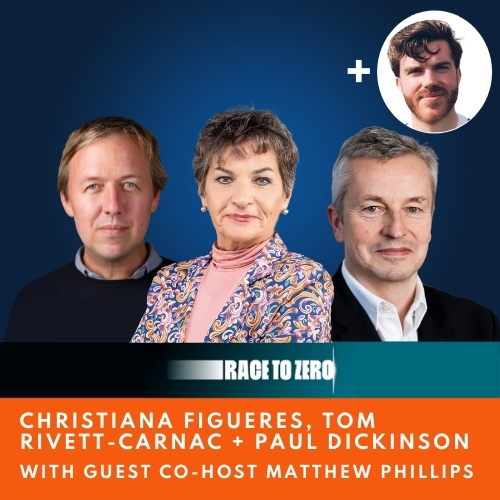
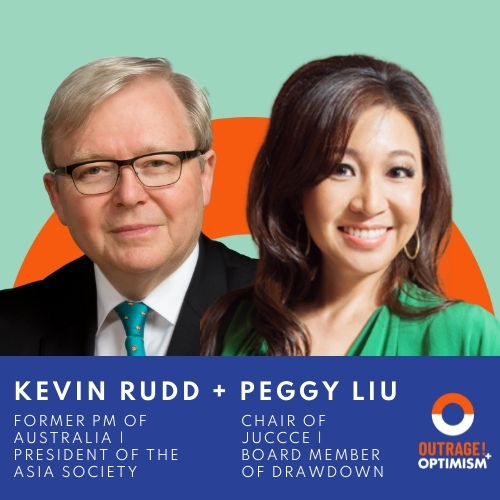
.jpg)
